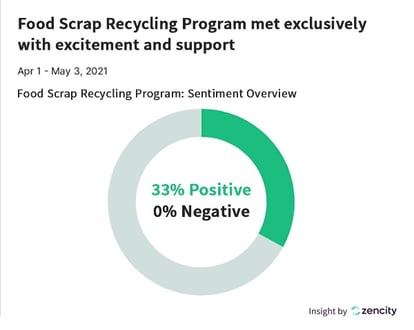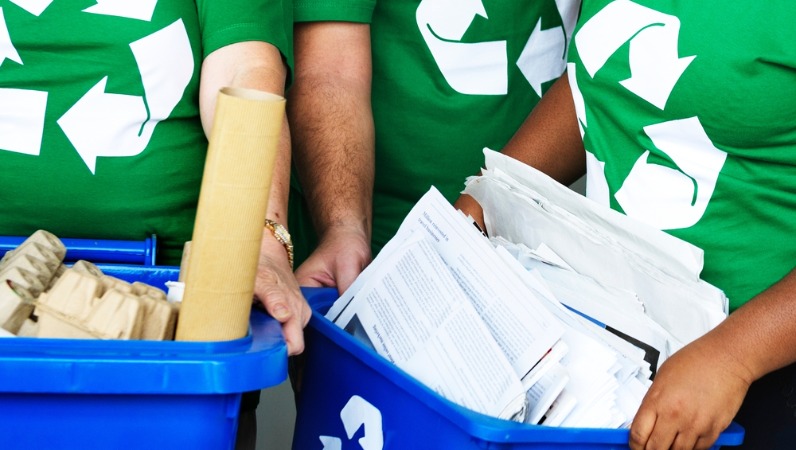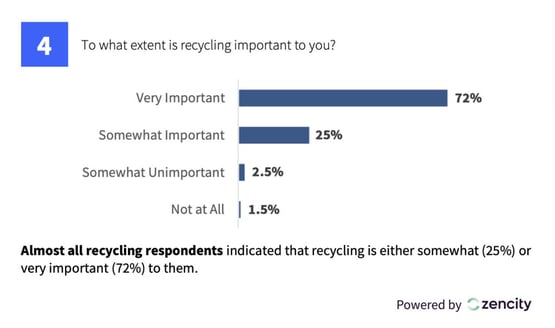The Future of Recycling Programs and the Role of Community Feedback
.png)
Zencity
The Platform for Community Trust
In 2022, all California cities and counties will be legally required to recycle organic waste. While not all states have mandatory recycling laws, whether for disposables or organic waste, most cities and counties have some sort of voluntary or required household recycling program, separate from requirements for commercial recycling. Why? Mainly to minimize landfills and mitigate the environmental impact of our garbage.
Although not always mandatory, Zencity’s experience working with local government organizations across the U.S. shows that Americans are pro-recycling and cities and counties understand that. Local governments are increasingly working to expand their recycling programs, promote resident engagement and knowledge, and innovate to combat climate change. We’re highlighting some of the work cities and counties are doing and why it matters.
How did recycling start?
Recycling has always been part of American society, but only became a part of government policy during World War II when residents were asked to recycle metals and more to support the war effort.
In the 1960s and early 70s, with the advent of the environmental movement, recycling in cities and counties became about improving the health of our planet and the push to create less waste.
Recycling as we know it today, picked up curbside or brought to a central location, is the result of overflowing landfills starting in the 1970s. According to an EPA Overview, in the 1960s, 94% of waste went to landfills, and as of 2018, that number has been reduced to only 50%. Recycling helps to decrease the amount of carbon dioxide released by landfills which helps to reduce the effect of greenhouse gases.
If most cities have some sort of recycling program, where does recycling go next?
Composting programs are becoming more and more popular throughout the United States and like recycling in the 60s — local, and now, state governments are getting on board to facilitate (and even mandate) the process. Composting programs work like recycling where residents place their organic waste, such as fruit and vegetable peels, coffee grounds, and other table scraps, outside for city or county pick-up, or they drop-off at a central location. A growing number of cities and counties have recognized the benefits of composting programs. From 2014 to 2019 alone, the number of communities offering composting programs grew by 65 percent!
Organic waste in landfills creates large amounts of methane, a potent greenhouse gas. Composting, or organic waste recycling, can significantly reduce methane output, and has other advantages like soil remediation, organic fertilizer, and higher yielding agriculture crops.
But it’s not just organic waste that has cities and counties working to bring their recycling programs to the next-level.
Innovative local governments with next-level recycling & composting
We identified five innovative cities and counties from across the country who are introducing new programs and/or engaging their communities on this topic! Along with our California cities, several of Zencity’s clients have already started their own composting programs and overall, public opinion has been positive.
- Pittsburgh, PA, just took their recycling to the next level with their Blue Bin Program – and their residents are in favor! Instead of residents using blue plastic bags to put out their recycling for collection, the City has now provided reusable recycling bins. The program aims to be bag free by 2023, making it easier to recycle and to reduce recycling contamination which can cause certain items to be unrecyclable. Their “Is it recyclable?” campaign to help residents learn what can and can’t be put in the bins, generated good engagement and positive sentiment.
- In Houston, TX, the discourse around the upcoming pilot program launch was overwhelmingly positive according to insight from our team of data analysts. Residents even suggested expanding the program to include education about how to compost, weekly pick-ups, and encouraging more home composting.
- In April of 2021, Stamford, CT, announced a new composting initiative. Overall, 33% of online discourse was positive and 67% of likes and shares were positive. Residents also shared pictures online of their new compost bins and kits.

- This past summer, Chattanooga, TN, had to suspend curbside recycling due to a staff shortage. Residents were very disappointed and let it be known on social media and other channels. But Chattanooga knows how to listen to its residents and respond to their priorities. When the City announced curbside recycling would resume this fall, the response was 62% positive!
- In Lewisville, TX, residents used Zencity to ask how important the city recycling program was to them and 75% answered that it was very important! They were eager for more information on what can be recycled and what can’t according to the program guidelines.
Survey on curbside recycling program.
— City Of Lewisville (@LewisvilleTexas) July 19, 2021
Potential changes to the current curbside recycling program would address contamination issues, extend the life of landfills, reduce the waste stream, and maintain cost efficiency for the City & residents.
Link: https://t.co/kCeGR5UJda pic.twitter.com/ZqXUflK5Tf
How to know if your community is ready for next-level recycling
Even if your community is already recycling, as a local government leader you can take it to the next-level by introducing education about how to prepare recyclables or by beginning to collect organic waste. How do you know if it’s the right time to begin widening your recycling program?
The quickest way to determine resident opinions is through a community survey. Surveys can help local governments understand where residents stand on important issues like recycling. A survey can also impact decision making on these issues.
Camden County, GA, ran a Zencity survey to get feedback on how many residents in the unincorporated area recycle, why they recycle, and what kind of recycling services they would like to see offered. As a result of the survey, Camden County now knows that residents are very pro-recycling and would like to see even more recycling options, bigger bins, and weekly collection.
As part of their “Fairfield Goes Green” campaign, the City of Fairfield, CA, is also running a survey with Zencity in order to gain insight into just how well residents’ understand California’s new composting law. The survey will focus on questions to help Fairfield most effectively tailor its messaging, and help the City understand the best way to inform and educate the public about the program. By being proactive, the City will be able to make sure that its implementation of California’s new law will be a success!
Want to ask your residents about recycling or composting? Run your next survey with Zencity. We do it all, from survey design to reaching a representative sample, and from distribution to producing actionable takeaways. Schedule a demo.
%20copy-1.png?width=544&height=120&name=Logo_black%20(1)%20copy-1.png)




